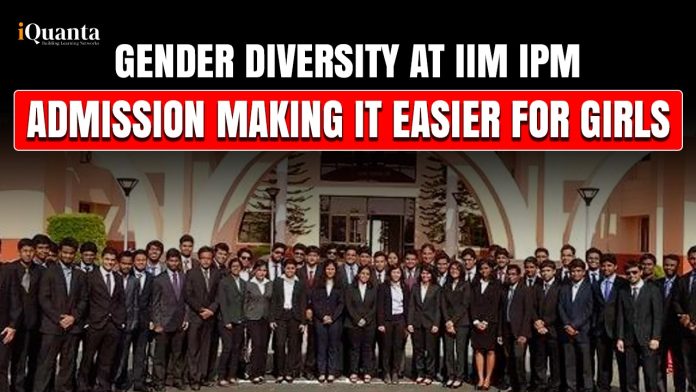Over the past decade, the Indian Institutes of Management (IIMs) have taken deliberate steps to make their admissions processes more inclusive, equitable, and reflective of India’s diverse student base. One of the most transformative initiatives in this direction is the Integrated Programme in Management (IPM), a five-year dual-degree course that admits students right after Class 12 and nurtures future business leaders from an early stage.

As these institutes expand their outreach, a significant focus has been placed on improving gender diversity within their classrooms. To that end, several IIMs have introduced structured policies such as bonus points for female candidates, supernumerary seats, and diversity weightage during selection. A noticeable shift: in some cases, women now make up 40–95% of IPM batches a development in Indian management education.
This blog takes a closer, data-driven look at how IIMs are reshaping their IPM admissions to promote gender diversity and how those efforts are translating into real numbers.
About IIM IPM Admissions
The IPM program offered by IIM Indore (since 2011), IIM Rohtak (since 2019), IIM Ranchi, IIM Jammu, and IIM Bodh Gaya is an early-entry management degree. It combines undergraduate and postgraduate business education, leading to a Master of Business Administration (MBA) after five years.
Unlike the traditional two-year postgraduate MBA, which requires a bachelor’s degree and performance in the CAT exam, the IPM is designed to nurture talent from the school level itself. This structure offers a more accessible route for students from underrepresented demographics, including girls from non-metro regions.
IIM IPM Admissions Gender Diversity
Recent batches at IIMs offering IPM programs indicate a significant improvement in gender ratios. These figures contrast sharply with earlier trends. For example, a 2013 batch at IIM Indore recorded just around 14% female students, suggesting a more than twofold increase over the past decade:
- IIM Indore (2022–27 IPM Batch): Out of 156 students, 33% were female
- IIM Rohtak (2023–28 IPM Batch): Out of 453 total seats, 434 were offered to female candidates, amounting to 95.8% female representation
- IIM Bodh Gaya and IIM Jammu (2023): Both institutes, in their first IPM cohorts, recorded above 40% female participation, though official seat-level data is limited
IIM IPM Admissions Policy Changes Supporting Diversity
Several IIMs have implemented formal admission policy modifications to promote gender balance in their classrooms.
1. Gender-Based Weightage in Final Selection
Institutes like IIM Rohtak and IIM Indore incorporate gender diversity scores as part of their evaluation matrix. For instance, IIM Rohtak’s official Admission Policy for 2024–25 allocates 10 marks out of 100 to gender diversity, specifically to female and non-binary candidates.
These additional points are factored into the final composite score that determines admission, providing a structured advantage in cases of closely matched applicants.
| IIM | Gender Diversity Weightage (for girls) | Details |
| IIM Rohtak | 20% of composite score | Includes both academic and gender diversity combined. |
| IIM Indore | ~6% of composite score | Applied during final merit list preparation. |
| IIM Ranchi | 5% bonus in composite score | Explicit bonus points for female candidates. |
| IIM Jammu | 10% of composite score | Clearly stated gender diversity component in admission formula. |
| IIM Bodh Gaya | Supernumerary seats (no weightage marks) | Separate seats reserved for girls, beyond the regular intake. |
2. Use of Holistic Assessment Criteria
This multi-dimensional evaluation is designed to look beyond traditional aptitude scores alone, thereby minimizing bias toward any one specific preparation path. The IPM admission process includes:
- IPMAT (Integrated Programme in Management Aptitude Test): Tests Quantitative Ability and Verbal Ability
- Personal Interview (PI): Evaluates general awareness, communication skills, and thought process
- Past Academic Record (PAR): Considers performance in Classes 10 and 12
IIM IPM Program Outreach and Awareness Efforts
While admission policies provide structural support, another crucial factor in gender inclusion is awareness. IIM Indore and IIM Rohtak, in particular, have publicly shared their focus on expanding IPM’s geographic and gender representation through such digital and in-person outreach programs:
- Webinars for school students across India explaining the IPM pathway
- Sample paper releases and open-house Q&A sessions
- Information sessions in Tier 2 and Tier 3 cities to reduce metro-centric reach
IIM IPM Program Gender Trends
It’s worth noting that the trend toward gender diversity is not restricted to IPM alone. Full-time MBA programs at IIMs are also recording more equitable ratios. The IPM numbers mirror this momentum and, in some cases, such as IIM Rohtak, even exceed them:
- IIM Kozhikode (2024–26 MBA Batch): 59.1% female
- IIM Bangalore: 40% female intake
- IIM Kashipur: 42% female in flagship MBA
IIM IPM Program Gender Diversity Feedback
While these developments are positive, the process is not without criticism. As the IPM programs mature, institutions are likely to refine these policies further to ensure both merit and diversity are balanced effectively:
- Equity concerns have been raised in public forums regarding heavily female-skewed batches (e.g., Rohtak’s 95% female intake), suggesting a need for balanced implementation
- Transparency in the allocation of diversity scores and their impact on cutoffs is often limited in public admission data
- Sustainability of high female participation across future batches depends on consistent outreach and continued policy support
The transformation of IIM IPM admissions into more gender-inclusive processes reflects a systemic shift in Indian higher education. By leveraging data-backed diversity scores, outreach efforts, and holistic evaluations, these institutions are correcting historical imbalances and broadening access to premier management education for girls across India. Though challenges remain, the rising female enrollment numbers demonstrate that structured interventions can drive meaningful change and that gender diversity, when pursued with clarity and consistency, can become a defining feature of India’s most competitive academic programs.
If you’re also preparing for IPMAT, don’t forget to check out iQuanta’s YouTube channel to get access to various free resources!


